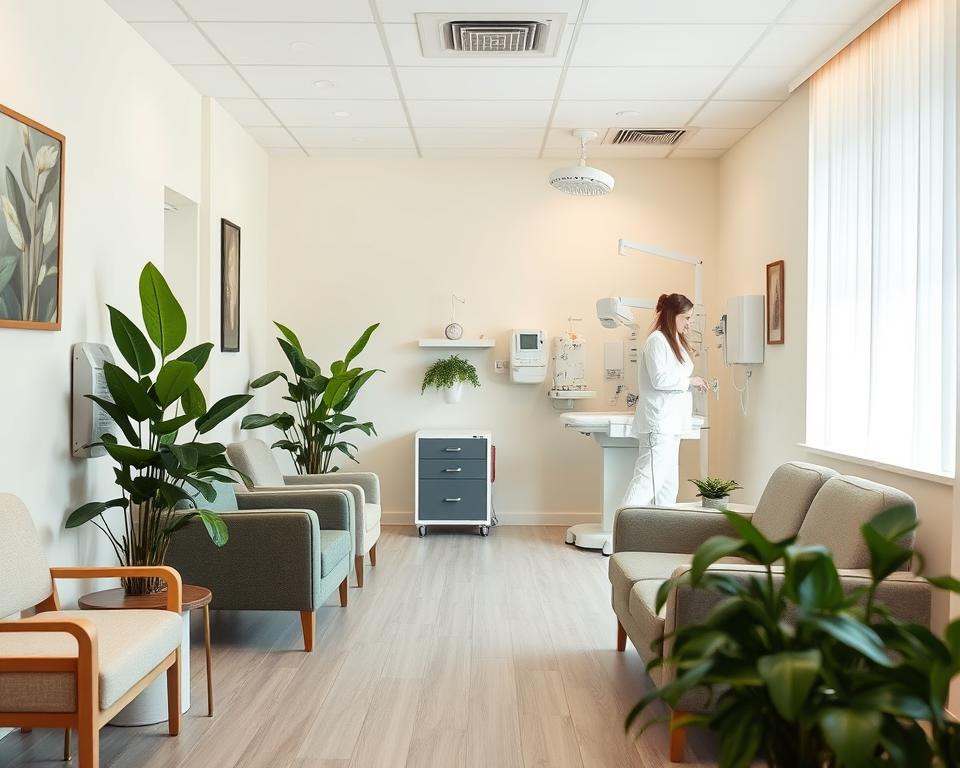Finding a trusted partner for your health needs is key. You want the best for your obstetrics and gynecology care. This includes women’s health, pregnancy, childbirth, and more. Expect personalized care that meets your needs, from routine checks to treating health issues.
Look for a provider who offers a wide range of services. This includes preventive care, managing pregnancy, and treating reproductive health issues. A specialized OB/GYN will give you personalized care. They’ll guide you through pregnancy, childbirth, and beyond, focusing on your health.
Key Takeaways
- Exceptional women’s health care includes obstetrics, gynecology, and pregnancy, offering the best specialty for women’s health.
- Personalized care is key for addressing unique needs and providing top-notch maternal and prenatal care1.
- Comprehensive services should include preventive care, pregnancy management, and treating reproductive health issues, all while providing the best obstetrics and gynecology specialty for women’s health.
- A specialized OB/GYN can offer tailored guidance and support throughout your journey, from pregnancy and childbirth to menopause and beyond, with a focus on women’s health and prenatal care.
- By choosing the right provider, you can expect exceptional care that prioritizes your health and well-being, providing the best obstetrics and gynecology specialty for women’s health, pregnancy, childbirth, maternal care, and prenatal care.
- Women’s health care is a crucial aspect of overall health, and finding the right provider can make all the difference in receiving the best obstetrics and gynecology specialty for women’s health.
Understanding Obstetrics and Gynecology Specialty
When it comes to women’s reproductive health, knowing about obstetricians and gynecologists (OB/GYNs) is key. OB/GYNs are doctors who focus on women’s health, especially in obstetrics and gynecology. They handle everything from routine check-ups to complex surgeries, playing a big role in women’s healthcare.
OB/GYNs can do many things, like routine care and some surgeries. They also do important gynecological services, like Pap smears and breast exams. They help with family planning and managing menopause too.
Obstetricians are especially important for pregnant women, helping with the pregnancy, birth, and aftercare.
In the U.S., there are over 110,700 OB/GYNs, with a 2% growth expected by 2028. But, there’s still a shortage of women’s health doctors, with 8,000 spots open in 2020. This number could rise to 22,000 by 2050. It’s important to find a specialized OB/GYN for all life stages.
Choosing a skilled OB/GYN means you get top-notch care for your health. They help prevent, diagnose, and treat health issues, from simple to complex. With their knowledge and care, you can be sure your health is in good hands.
Essential Prenatal Care Services

When you’re expecting, regular prenatal check-ups are key for a healthy pregnancy. You’ll see your obstetrician near me every 4 weeks from weeks 4 to 28. Then, every 2 weeks from weeks 28 to 36, and weekly from weeks 36 to 41. These visits help your healthcare provider keep an eye on your health and your baby’s growth.
A women’s health clinic provides a wide range of ob/gyn services, including prenatal care, gynecological care, and more. At your first prenatal visit, your provider will do a physical exam and check your weight, height, blood, blood pressure, and urine. They’ll also determine your due date. They might do a pelvic exam and Pap smear to check for infections.
Some healthcare providers, like Certified Nurse Midwives (CNMs), focus on family-centered maternity care. Others, like Perinatologists, specialize in high-risk pregnancies. Your obstetrician near me will help you create a care plan tailored to your needs.
Choosing an obstetrician near me and a comprehensive women’s health clinic is crucial for easy and consistent care. By focusing on prenatal care and working with a skilled healthcare provider, you’re on the path to a healthy, happy pregnancy.
Comprehensive Gynecological Care
Finding a trusted gynecologist near you is key for women’s health. An obstetrician-gynecologist (OB-GYN) focuses on women’s reproductive health. They handle diseases and functions unique to women and girls. Regular check-ups and screenings, like Pap smears and mammograms, are crucial for health and preventing diseases.
A good gynecological care service includes annual exams and well-woman care. It also covers cervical cancer screening, birth control counseling, and menopausal care. Reproductive health management is also important, covering birth control, family planning, and fertility services. OB-GYNs also diagnose and treat conditions like endometriosis, fibroids, and PCOS.
Some of the services provided by OB-GYNs include:
- Preconception planning and prenatal care
- Birth control and family planning
- Menopause management and preventive care
- Treatment of gynecological conditions, such as incontinence and pelvic floor disorders
It’s important to find a trusted gynecologist for ongoing care. They handle both obstetric and gynecological needs.
In conclusion, comprehensive gynecological care is vital for women’s wellness. Finding a trusted gynecologist near you is essential for ongoing care. By understanding the services provided by OB-GYNs and the importance of regular check-ups and screenings, women can take control of their reproductive health and well-being.
| Service | Description |
|---|---|
| Annual Exams | Regular check-ups for women’s health |
| Well-Woman Care | Comprehensive care for women’s wellness |
| Cervical Cancer Screening | Screening for cervical cancer, including HPV testing |
Your Journey Through Pregnancy and Childbirth
Starting your journey through pregnancy and childbirth is a big step. It’s key to know about obstetric services and pregnancy care. These include preconception care, prenatal visits, and tests. You’ll also get care from a team of doctors and medical experts.
You can expect help with high-risk pregnancies, labor, and childbirth services. They’ll also manage pregnancy-related issues or miscarriage.
During your pregnancy, you’ll get many resources. This includes maternity care like routine prenatal visits and postpartum support. You might also see fertility specialists and other experts for guidance.
Many places offer in-person and online maternity classes. They also have advanced NICU and pediatric care.
Finding a healthcare provider is crucial. Look for one that offers full obstetric services and pregnancy care. This includes care for high-risk pregnancies, gynecologic cancer, and pelvic floor disorders. Choosing the right provider ensures a healthy and positive experience.
Advanced Diagnostic Procedures and Treatments

Advanced diagnostic procedures and treatments are key in gynecological surgery, postpartum care, and maternal healthcare. You can expect a variety of services. These include minor office procedures and outpatient procedures like lab tests and hormone testing. You’ll also find certified OB/GYN ultrasound, in-office fetal monitoring, and first trimester screening for fetal abnormalities.
Imaging services, like ultrasounds, are vital for monitoring fetal development and spotting gynecological issues. Minimally invasive procedures are also available. They offer less discomfort and quicker recovery times for many conditions. These advanced services are part of comprehensive maternal healthcare, leading to better outcomes in obstetric and gynecological care.
Some key services include:
- Lab tests and hormone panels
- Genetic screenings and counseling
- Imaging services, such as ultrasounds and mammograms
- Minimally invasive procedures for gynecological conditions
These services aim to give you the best care, from routine check-ups to complex treatments. They are often covered by insurance, but coverage details can vary based on your plan.
Preparing for Your First OB/GYN Visit
When you’re getting ready for your first OB/GYN visit, make sure to collect all the important info. This includes your medical history, like medications, allergies, and surgeries. Also, list any chronic conditions, family health history, and when your last period was. It’s a good idea to bring a friend or family member for support.
Your doctor might suggest seeing them every four weeks in the first trimester. These visits are key for checking your health and your baby’s growth. They might also offer childbirth classes to help you get ready for your baby’s arrival. These classes cover labor, delivery, and what to expect after your baby is born.
Your OB/GYN can also help with gynecological issues and guide you on preventive care. This includes routine check-ups and screenings. By focusing on your reproductive health and getting help from an experienced OB/GYN, you can have a healthy and positive pregnancy and beyond.
Here are some important things to remember for your first OB/GYN visit:
- Gather your medical history and any important documents
- Make a list of questions or concerns to talk to your doctor about
- Think about bringing someone you trust to the appointment
- Ask about resources like childbirth classes or support groups
Being prepared and informed helps you take charge of your reproductive health. This way, you can make the most of your OB/GYN visit.
Women’s Wellness and Preventive Care

As you go through different life stages, keeping your health in check is key. Regular check-ups and preventive steps can greatly improve your health, especially in reproductive health. From 2007 to 2010, over 50% of visits by women aged 18 and older were for preventive care.
Annual exams are crucial for women’s health. They let healthcare providers keep an eye on your health and catch problems early. These exams also cover postnatal care and postpartum care for new moms. Plus, they help with maternity care and planning your family.
Obstetrician-gynecologists offer many services, like colposcopy and Pap smears. These minor procedures can diagnose and treat health issues. Many places, like Northwestern Medicine, provide a wide range of services, including fertility and genetics.
By focusing on your health, you can lower your risk of health problems and live a better life. Make sure to get regular check-ups and talk to your healthcare provider about any concerns. This way, you’ll get the best care possible.
Specialized Reproductive Healthcare Services

Reproductive healthcare is vital, and you need specialized services. An obstetrician offers full care, from gynecological exams to maternity services. An obgyn specialist helps with family planning, fertility, and complex gynecological issues.
Healthcare providers also do advanced procedures like laser surgery and endometrial ablation. They help with fertility, including diagnosis and treatments for endometriosis and fibroids.
Places like Northwestern Women’s Health Associates offer many services. They do routine exams, laparoscopic surgeries, and help with birth control. Advocate Health Care also provides specialized care, including breast health and fertility evaluation.
Finding the right obgyn specialist is key. They give you personalized care, making you confident in your health.
Look for these services in a healthcare provider:
- Fertility evaluation and treatment
- Management of complex gynecological conditions
- Maternity services
- Routine gynecological exams
Choosing a provider with these services means you get full care for your reproductive health.
Managing Your Reproductive Health Journey
As you go through different stages of your reproductive health, having a trusted women’s healthcare provider is key. A gynecologist can give you full gynecological services. This includes routine check-ups, screenings, and treatments for gynecological issues. For family planning, you can get advice on birth control options like pills, IUDs, implants, and permanent sterilization.
Your obgyn can also help with preconceptual counseling for pregnancy. They offer menopausal care too, including hormone therapy, symptom management, and lifestyle changes. Common issues women face include vaginal discharge, painful sex, abnormal bleeding, UTIs, ovarian cysts, endometriosis, and pelvic pain.
It’s important to have a women’s healthcare provider who supports you from adolescence to post-menopause. They can teach you about reproductive health, prevent infections, and provide prenatal care. Choosing a specialized obgyn ensures you get the care you need.
| Reproductive Health Services | Description |
|---|---|
| Family Planning | Birth control counseling, preconceptual counseling |
| Fertility Services | Fertility assessments, ovulation tracking, assisted reproductive technologies |
| Menopause Management | Hormone replacement therapy, symptom management, lifestyle adjustments |
Postpartum Care and Recovery
After labor and delivery, it’s key to focus on women’s wellness and tackle any gynecological issues that pop up. OB/GYN services are vital in helping new moms during this time. Most people lose about 13 pounds during delivery, including the baby, placenta, and amniotic fluid. It’s important to have check-ins with healthcare pros within 2 to 3 weeks after delivery and a full postpartum exam within 6 to 12 weeks.
Common postpartum worries include wound healing, postpartum depression, and adjusting to being a new parent. Getting help with breastfeeding is also crucial. The American College of Obstetricians and Gynecologists suggests talking about mood, emotional health, sleep, tiredness, birth control, baby care, and sex during postpartum visits.
The hospital offers prenatal breastfeeding classes to help women prepare for breastfeeding. They also have a donor milk program for infants in need. The PEAPOD Clinic does tests like pelvic floor and endoanal ultrasound and anorectal manometry to check pelvic floor and anal sphincter muscles after childbirth.
Risk factors for severe obstetric anal sphincter lacerations include forceps use, long pushing phase, episiotomy, large baby, delivery position, and older maternal age. Symptoms of postpartum depression include big mood swings, loss of appetite, exhaustion, and no joy in life shortly after childbirth. Common physical issues after vaginal birth include hemorrhoids, leaking urine, sore breasts, vaginal discharge, and vaginal soreness.
| Postpartum Care Services | Description |
|---|---|
| Postpartum checkups | Ongoing check-ins with healthcare professionals within 2 to 3 weeks after delivery |
| Lactation support | Breastfeeding consultations, treatment of breastfeeding-related conditions, and guidance on pumping and weaning |
| Pelvic floor assessment | Tests such as pelvic floor and endoanal ultrasound and anorectal manometry to assess pelvic floor and anal sphincter muscles after childbirth |
Modern Surgical Techniques in Women’s Health
When looking into women’s health care, it’s key to know about the latest surgical methods. These new ways have changed how we do things in obstetrics and gynecology. They offer less invasive options for many procedures, making postnatal care and gynecological services better.
OBGYN services now include many surgical options, like laparoscopic and robotic-assisted surgeries. These methods have smaller cuts, less pain, and quicker healing. They focus on women’s wellness, making it easier to handle health issues with more care.
Some advanced surgical procedures include:
- Endometrial ablation for excessive bleeding
- Pelvic prolapse repair for weakened pelvic muscles
- Hysterectomy for various gynecological conditions
These surgeries aim to boost women’s health and wellbeing. They’re often done without needing to stay in the hospital. Laser surgery, diagnostic laparoscopy, and tubal ligation are some of the many procedures done on an outpatient basis. By picking a skilled OB/GYN and staying up-to-date on new techniques, you can manage your women’s health better.
Integrated Approach to Women’s Healthcare
At our women’s health practice, we focus on your total healthcare needs. Our team of OB/GYN specialists provides top-notch gynecological care and obstetric services. They support you from pregnancy to childbirth. With over 75 years of experience, they work together to give you care that fits your needs.
We handle everything from routine check-ups to advanced treatments. Our goal is to cover all your gynecological and reproductive health needs. Whether you need family planning advice, help with menopause, or are expecting a baby, we’re here for you.
We care about your well-being, not just your health. We offer therapies to help your overall health and wellness. You can also get imaging services and childbirth care at Elmhurst Hospital. You’re in good hands with us.
FAQ
What is an OB/GYN?
An OB/GYN is a medical expert who handles both obstetrics and gynecology. They care for women from adolescence to menopause. They are well-trained in women’s health.
What services do OB/GYNs provide?
OB/GYNs offer many services. They do routine check-ups and preventive care. They also manage pregnancies and treat reproductive health issues. They can do both medical and surgical procedures.
Why should I choose a specialized OB/GYN?
Specialized OB/GYNs have deep knowledge in women’s health. They give personalized care for all your needs. This includes routine check-ups and complex treatments.
What can I expect during my first OB/GYN visit?
At your first visit, the doctor will ask about your health history. They will do a physical exam and talk about your concerns. They might also order tests for your care.
How important are regular check-ups and preventive care?
Regular check-ups and care are key for women’s health. Your OB/GYN will do screenings like Pap smears and mammograms. These help find health issues early.
What kind of specialized reproductive healthcare services do OB/GYNs provide?
OB/GYNs offer many reproductive health services. This includes fertility tests, assisted reproductive technologies, and managing complex conditions. They also treat sexually transmitted infections.
How do OB/GYNs support women throughout their reproductive health journey?
OB/GYNs support women from adolescence to after menopause. They offer family planning, fertility management, and menopause care. They meet a woman’s changing healthcare needs.
What kind of postpartum care and support can I expect from my OB/GYN?
After giving birth, your OB/GYN will check on you. They address physical and emotional concerns. They also offer lactation support and watch for complications for a smooth recovery.
What are the benefits of modern surgical techniques in women’s healthcare?
Modern surgeries like laparoscopy and robotic surgery have changed women’s healthcare. They use smaller cuts, cause less pain, and help you recover faster. This makes treatments more precise and effective.
How do OB/GYN practices provide an integrated approach to women’s healthcare?
Modern OB/GYN practices take a holistic approach to women’s health. They address physical, emotional, and reproductive well-being. This ensures your unique needs are met at every life stage.
Source Links
- Modern Women’s Care | Obstetric & Gynecological Care – https://modernwomenscaremd.com/
- Hoag Women’s Health Specialty – https://www.hoag.org/specialties-services/womens-health/
- Obstetrics and Gynecology: Understanding the Differences – Women’s Health of Augusta Obstetrics and Gynecology: Understanding the Differences – https://www.womenshealthofaugusta.com/obstetrics-and-gynecology-understanding-the-differences/
- Understanding The Different OB-GYN Specialties – University OB/GYN Associates – https://www.universityobgynassoc.com/2023/09/15/understanding-the-different-ob-gyn-specialties/
- Similarities And Differences Between Obstetrics And Gynecology – Raleigh-OBGYN – https://www.raleighob.com/similarities-and-differences-between-obstetrics-and-gynecology/
- Prenatal care checkups – https://www.marchofdimes.org/find-support/topics/planning-baby/prenatal-care-checkup
Stay with yugalglobal.com to get more content.


